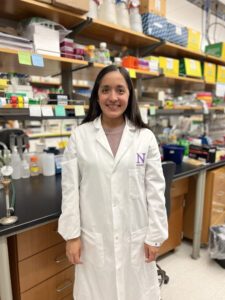Nanotechnology at Northwestern
Meet Maria de Lourdes Cabezas, a postdoctoral associate in the Jewett Lab
April 25, 2022
Maria de Lourdes Cabezas is a postdoctoral associate in the Jewett Lab, which is reconceptualizing the way complex biological systems are engineered for compelling applications in medicine, materials, and energy.

Where are you originally from?
I am originally from Guayaquil, Ecuador. My family moved to South Texas around the time I started high school.
Where did you complete your undergraduate degree?
I received bachelor degrees in Chemistry and Biomedical Engineering from The University of Texas at Austin.
When did you first become interested in chemical and biological engineering?
At the end of my graduate work, I got really excited about exploring innovative ways to reprogram biology. That led me to search for labs that conduct research in synthetic biology. Here at NU, the Chemical and Biological Engineering department has an excellent team of synthetic biologists and I found that the team led by Prof. Jewett was the place where I wanted conduct research.
How do you explain what you study to non-scientists?
Many pharmaceuticals have been isolated from bacteria. However, there is a vast number of these natural products that have not yet been identified because it is difficult to culture some out of their native environment.
In collaboration with the Balskus lab at Harvard, we are are working towards developing a platform for natural product discovery that utilizes cell-free expression systems combined with computationally guided genome search. Here, cell-free expression systems allow me to use the ‘guts’ of E. coli to quickly assemble biochemical pathways from predicted DNA sequences previously identified by genome mining. In this way, this platform would enable me to identify novel natural products.
What inspired you to focus on high-throughput technologies for engineering biology using cell-free systems? What do you hope to achieve?
Antibiotic resistance along with slow antibiotic discovery are urgent threats to our healthcare. High-throughput technologies such as automated liquid handling systems can accelerate research because experiments can be set up faster without the need for intensive labor at the bench.
In my research, these technologies enable my work using cell-expression systems and genome mining to discover natural products. I hope that my research can accelerate the discovery of novel molecules that have antimicrobial properties or that can be repurposed for other therapeutic applications.
What has been a highlight of your time at Northwestern?
Working alongside talented colleagues has been a wonderful experience throughout my tenure at Northwestern. After the long hours, many failed attempts, and some eureka moments, I have to recognize that I’ve been fortunate to have a lot of support from my labmates and colleagues.
What has been the most challenging aspect of your work or your time at Northwestern?
Working through the COVID-19 pandemic certainly proved challenging in the beginning. I remember how hectic it was for me to wrap up experiments in the last few days before we were sent home and that we modified our work schedules to comply with safety rules. This experience taught me to take advantage of my time in lab, refine my time management skills and work with my colleagues as a team during these difficult times.
Can you tell me about your experiences either being mentored or mentoring others?
As a postdoctoral scholar, I deeply value the mentorship I’ve received from Prof. Jewett throughout the years. His support has helped me figure out ways in which I can keep my research focused and directed, as well as to continue building a strong foundation for my career. During this time, I’ve also had amazing opportunities to mentor graduate and undergraduate students which has been extremely rewarding. Their contribution has been instrumental in achieving success in our research projects.
What are your hobbies outside of the lab?
I enjoy dancing flamenco and spending time with family and friends. During the pandemic, I picked up embroidery and trying new recipes in the kitchen. As a new mom, I now spend most of my time learning about how I can help my infant daughter develop basic skills.